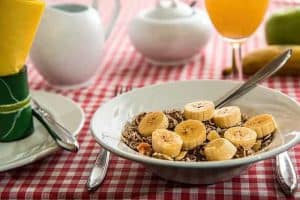Rationally constructed slimming diet allows you to replace unnecessary kilograms of fat with a beautiful, slim figure. Although changes in nutrition are necessary in case of overweight, they do not have to be drastic. It is a myth that you have to eat carrots, yogurt and lettuce or similar foods while losing weight. In this article we prove that you can have a varied and tasty diet and lose weight at the same time. Here is an effective and easy to persevere weight loss diet that will get you into the clothes size of your dreams!
Table of contents
Effective weight loss diet – what to keep in mind
An effective weight loss diet is one that leads to regular weight loss at a moderate pace. Therefore it is necessary to create a diet plan with reduced calorie content in relation to the body’s needs. At the same time, remember not to cut calories too drastically!
A slimming diet should be neither too monotonous nor too poor in rations. On the contrary, the prepared dishes should be tasty, varied and adequately filling. Weight loss diet, which is not associated with pleasure of eating, and which instead causes that we often feel hunger and increased appetite for “something good”, usually causes rapid discouragement and return to bad eating habits.
Slimming diet – the main principles
 The first rule of an effective slimming diet is the exclusion from the menu of foods that lead to the accumulation of fat tissue. These are mainly products containing large amounts of simple sugars. Also products from white flour and those with a large amount of animal fats are dangerous for the figure. Instead of these types of food it is worth introducing dietetic substitutes (the list can be found below).
The first rule of an effective slimming diet is the exclusion from the menu of foods that lead to the accumulation of fat tissue. These are mainly products containing large amounts of simple sugars. Also products from white flour and those with a large amount of animal fats are dangerous for the figure. Instead of these types of food it is worth introducing dietetic substitutes (the list can be found below).
The second important rule of effective slimming diet is optimal planning of the menu and sticking to the hours of meals and their content. Eat 5 light meals a day, every 3 hours or so, and don’t reach for bonuses like coffee with whipped cream or a creamer after dinner or a packet of crisps with a movie. Don’t worry, giving up your favorite desserts and snacks doesn’t have to be a binge. You can introduce equally good, non-obesity-inducing substitutes instead.
Here is a list of products forbidden during weight loss and suggested substitutes:
- White bread
- Fatty types of meat
- Bacon, tinned meat, pâtés, fatty cold meats (choose lean meats instead, e.g.poultry
- Fatty milk and fatty cheeses
- Margarine and butter
- Dumplings, pasta, potato dumplings and other products made of white flour
- Fast food
- Dish coated in breadcrumbs and then fried
- Flour, fatty cream, roux for thickening soups and sauces
- Crisps, sticks, sweets for “snacking”
- Cakes
- Cakes
- Bars, sweets, wafers
- Sugar
- Ready-made sauces, mayonnaise
- Sweet, colored drinks, alcohol
(replace it with wholemeal bread, but don’t overdo it)
(you can replace them with turkey or chicken meat without skin, sirloin and pork ham and fish)
or pork sirloin and ham, lean poultry sausage)
(low-fat milk, cottage cheese, mozzarella cheese and feta cheese are better choices)
(bread can be spread with cream cheese or coconut oil)
(you can prepare dumplings with wholemeal flour and replace white pasta with wholemeal)
(instead of using ready-made fast food dishes, you can make your own diet versions – e.g. vegetable or poultry burgers, graham cracker casseroles with mushrooms and mozzarella, chicken breast shoarma with oven chips or wholemeal pizza)
(you can prepare a diet coating of sesame seeds, crushed oatmeal or cornmeal, ground flaxseed, etc., and then bake the dish in the oven)
(you can use natural yogurt, cream cheese, blended or grated vegetables, e.g. carrots)
(you can also snack on: vegetables in bars dipped in diet dip, nuts and almonds, pumpkin seeds, apple, carrot or beetroot chips, dried fruit)
(replace them with diet cakes, which can be made quickly and easily from oatmeal and other cereals, raisins, honey or xylitol, crushed nuts, bran, millet, cocoa and similar ingredients)
(traditional cakes can also be replaced by dietary equivalents: cold cheesecake on homogenized cheese or yogurt, shortcrust pastry made with whole wheat flour, xylitol and coconut oil, red bean chocolate cake or carrot cake)
(an excellent equivalent would be self-made oat bars, millet balls a’la Rafaello, whole grain wafers filled with cacao and avocado paste and similar treats)
(low-calorie sugar substitutes: xylitol, erythrol, stevia)
(a better option would be vegetable, yogurt, herb sauces and dips)
(it is much better to replace them with mineral water, green tea, juices without added sugar, fruit teas, compote sweetened with xylitol etc.)
Slimming diet – how many calories to consume and how to compose meals?
There is only one answer to the question of how to lose weight in a rational way without yo-yo effect – reduce your calorie intake by about 400-600 calories in relation to your daily needs. Here comes another question – what is my daily calorie demand? To calculate it with great accuracy, you can use special calculators available on the Internet. Numerous criteria will be taken into account, such as age, gender, height, level of physical activity. If you do not want to make an in-depth analysis, you can use general information.
It is generally accepted that the daily calorific requirement for women with a sedentary lifestyle is about 2000 kcal, for moderately active women about 2200 kcal, and for very active women about 2500 kcals. The rates for men are about 500 kcal higher.
 Reducing the amount of calories consumed is a key issue, but it is also very important to be able to compose meals properly (with the right balance between carbohydrates, proteins and fats).
Reducing the amount of calories consumed is a key issue, but it is also very important to be able to compose meals properly (with the right balance between carbohydrates, proteins and fats).
Our body should function in such a way that there are no sudden spikes in blood sugar, digestive disorders and drops in metabolic rate. Breakfast is basically the only meal during which you can “indulge yourself a little”.
Breakfast can, and even must, be rich and wholesome. Ideally, it should include fiber, protein, and some vegetables or fruit. When preparing lunches, do not regret vegetable ingredients (both in the form of cooked and raw) – they are very filling and have very few calories. Use thick groats, brown and wild rice, quinoa, wholemeal pasta. Meat side dishes should be of the lean type, or you can replace them with fish. As for fats, choose healthier ones, i.e.: coconut oil, olive oil, good quality vegetable oils.
Dinners should be dominated by protein and vegetable products, there may also be a small amount of complex carbohydrates (e.g. a slice of wholemeal bread). Eggs, cottage cheese, fish and vegetable paste and diet salads are good choices. For second breakfasts and snacks choose light salads, small diet snacks, vegetable and fruit cocktails as well as raw fruit and vegetables.
Monday
- Breakfast
- 2nd breakfast
- Dinner
- Teatime
- Dinner
: scrambled eggs with tomatoes and basil, wholemeal bread, half a grapefruit
: natural yoghurt with muesli
: buckwheat groats, chicken balls in yoghurt and dill sauce, salad
: half a grapefruit, oat biscuits
: cottage cheese, toast with wholemeal bread, radishes
Tuesday
- Breakfast
- 2nd breakfast
- Lunch
- Teatime
- Dinner
: millet with peanut butter and raisins (or fresh blueberries)
: cottage cheese with chives, tangerine
: one-pot dish of tomatoes, peppers, zucchini, onions and diced chicken breast
: kefir, handful of nuts
: salad with brown rice, ham and vegetables
Wednesday
- Breakfast
- 2nd
- Dinner
- Afternoon
- Dinner
: graham cracker with poultry sirloin, tomato, 2 cucumbers
breakfast: homogenized cheese (preferably natural) with bran
: potatoes with water (no breadcrumbs), baked fish, mizzle with yoghurt
snack: dessert with semolina, yoghurt and fruit.
: wholemeal sandwiches with hard-boiled egg and tomato
Thursday
- Breakfast
- 2nd
- Dinner
- Afternoon
- Dinner
: oatmeal with banana
breakfast: salad with green salad, olives, peppers and smoked salmon
: cream of broccoli soup with toasts, omelette with mushrooms
snack: smoothie of vegetables and fruit selected with the addition of chia seeds
: graham cracker with tuna paste, small-salted or pickled cucumbers
Friday
- Breakfast
- 2
- Dinner
- Teatime
- Dinner
: pancakes from wholemeal flour with fruit, yoghurt or jam
breakfast: buttermilk, 2 carrots
: penne pasta with turkey stew, peppers, onion, tomato and mushrooms
: rice wafers, orange
: wholemeal sandwiches with egg paste on natural thick yoghurt
Saturday
- Breakfast
- 2
- Lunch
- Afternoon
- Dinner
: 2 soft-boiled eggs, wholemeal toast, lettuce, radishes
breakfast: rice with stewed apples with cinnamon
: a casserole with chickpeas, courgettes, peppers, corn, tomatoes, chicken and mozzarella
snack: millet cookies, kefir
: Greek style fish, slice of wholemeal bread
Sunday
- Breakfast
- 2nd
- Lunch
- Teatime
- Dinner
: wholemeal bread sandwiches with ham, light yellow cheese, cucumber and tomato
breakfast: fruit salad
: roast chicken breast, oven chips, green salad with lemon juice
: smoothie of fresh spinach, citrus and ginger
: vegetable pate, tomato or yoghurt dip
Also read: Piperine for weight loss

